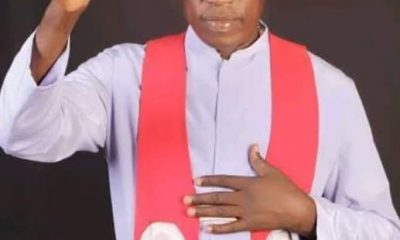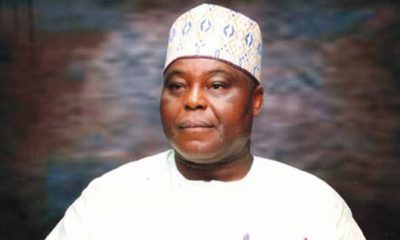News
Embattled Emir Sanusi Lamido may be dethroned a second time next week

By Bonaventure Melah
A Federal High Court in Kano, has fixed Thursday, June 20, 2024, to decide whether the new Emirate Law created by the Abba Yusuf administration should stay.
If the court nullifies the new law, Sanusi Lamido who was reinstated as Emir by Governor Abba Yusuf on May 24 2024 would be made to vacate the seat for a second time, paving way for Aminu Ado Bayero who was dethroned as a result of the law created by the Kano government to take back his position. He would then be reinstalled as the 17th Emir of Kano.
In his ruling on Friday, the presiding judge, Justice Abdullahi Muhammad Liman fixed the date to rule on a motion filed by counsel for Aminu Babba Dan’Agundi, who is seeking the court to declare the Kano Emirates Council (repeal) Law 2024 null and void.
The applicant, who is the traditional title holder of Sarkin Dawaki Babba of Kano emirate, approached the court seeking to enforce his fundamental human rights said to have been violated by government action in the Emirship tussle.
The respondents in the suit are Kano State Government as 1st respondent, Kano State House of Assembly (2nd), Speaker of Kano State House of Assembly (3rd), Attorney General of Kano State (4th), Kano Commissioner of Police (5th), Inspector General of Police, IGP (6th), NSCDC and DSS as 7th and 8th respondents respectively.
Dan Agundi’s lawyer Chikaosolu Ojukwu SAN moved the motion after the court refused an application for a stay of proceedings orally moved by counsel for the Kano State House of Assembly and its speaker, Eyitayo Fatogun SAN.
Fatogun drew the attention of the court dissatisfied with the ruling of the court on Thursday assuming jurisdiction in the matter, noting that he has filed a notice of appeal at the court of appeal and motion on stay of execution.
He urged the judge to adjourn in view of the processes filed pending hearing and determination of his application at the court of appeal.
Counsel for the attorney general of Kano state and the state government A. G. Wakil aligned himself with the position of Fatogun.
The applicant’s counsel countered saying the authorities cited by the defence were not judicial decisions but rules of court.
Justice Liman ruled that from the acknowledged receipted letter of the defence counsel, it is clear that no date is fixed and there is no evidence that the appeal has been entered.
The judge held that the court would hear the pending application as there was no formal stay of proceedings application before the court.
When the plaintiff’s counsel rose to move his motion seeking a declaration of the conduct of the dependants as null and void, counsel for the assembly and its speaker Eyitayo Fatogun applied to be recused from the matter and asked for an adjournment to enable his clients to find another lawyer.
He argued that he cannot defend the interest of clients who have the fundamental right to be heard and to proceed is to deny them their right.
Justice Liman held that the conduct of the lawyer amounted to an abuse of the court process.
While noting that he intends to abandon the procedural route, the judge said the sacred duty of courts is to serve justice to all manner of people.
Counsel for Kano government AG Wakil opposed the plaintiff’s application having filed his application for a stay of proceedings arguing that if granted the substantive case is over.
The plaintiff’s lawyer then withdrew his application to amend his originating motion dated 31/024 which the judge struck out and adjourned to Thursday, June 20 for ruling on the motion seeking the court’s declaration that the Kano Emirates Council repeal law 2023 is null and void.
On Friday also, a Federal High Court in Kano upheld the rights of movement and freedom to civil liberty of the deposed Emir of Kano, Alhaji Aminu Ado Bayero.
The court also asked the Kano State Government to pay N10m damages to the 15th Emir.
In his judgment, the Presiding Judge of the Federal High Court 3, Justice Simon Amobeda, upheld the applicant counsel’s withdrawal of reliefs Order 1-2 on the grounds that they have the right by the rules of law to do so and as such they are no longer part of the case.
He also hinted that he was duty-bound to resolve the issues of jurisdiction of the court to determine the case before he delved into the main matter of the case.
Justice Amobeda, while upholding the jurisdiction of the court to hear the case, insisted that it falls within the issues of abuse of fundamental human rights of the applicant and the Constitution granted the court powers to preside over the matter.
He said the relying points of the applicants are reliefs 2-7 seeking among others payments of N5 bn as damages for threatening his human rights.
“It the duty of the court to protect the rights of every citizen but that protection cannot be done in a vacuum, a person crying violation of his fundamental human rights must provide cogent and vital evidence to that effect to which the applicant has successfully provided,” the judge said.
“Government used the kingmakers to select a new emir, but surprisingly on Friday, May 23, 2024, the government used social media to propagate that he had deposed the applicant and declared that police should arrest him after giving him 48 hours to vacate the palace.
“I hold that without any lawful justification, the applicant is threatened, breaching his fundamental rights to liberty as guaranteed in Section 35(1) of the 1999 Constitution.
“Similarly, there is an act of the government which has forced the applicant to a house arrest, preventing him from going about his lawful business, constitutes a flagrant violation of his fundamental rights to freedom of movement as guaranteed under section 41(1) of the 1999 Constitution.
“That the 2nd, 3rd, 4th and 5th Respondents that is the Police, the DSS, Army, Air force, Navy, are either by themselves, their agents, servants, privies or any other person’s or authority forthwith restraint from arresting, detaining, harassing the applicant.
“That the second respondent and the Government of Kano State should pay the sum of N10 million for breach and likely breach of his Fundamental Right to Personal liberty and freedom of movement as guaranteed in the 1999 constitution,” the judge said.
It would be recalled that Sanusi was installed as Emir of Kano on June 8, 2014 in a controversial manner following the death of Emir Ado Bayero , his great-uncle and father of Aminu Ado Bayero.
Sanusi was however dethroned in 2020, during the administration of Governor Abdullahi Umar Ganduje.
He was then succeeded by his cousin Aminu Ado Bayero.
In dethroning Sanusi, the state government had accused Sanusi of insurbodination and other infractions, including not conducting himself in accordance with the laws governing traditional institutions and failing to.acvount for huge sims of money allocated by the government to the emirate
For example, Emir Sanusi refused to conform to the palace etiquette when delivering speeches. These were meant to be short, measured and delivered only when necessary. But he went public at the slightest opportunity to express his opinion, even on government policies.
In addition, government in Kano saw him more as an opposition mouthpiece than a father and a collaborative stakeholder. This became more pronounced during the 2019 elections, when he was alleged to have clandestinely supported the opposition’s Abba Kabir Yusuf who is now the governor of the state
Prior to his emergence as emir, Sanusi ran into stormy waters with political authorities as governor of the Central Bank of Nigeria between 2009 and 2014. He was removed from that office by then President Goodluck Jonathan following the leak of a memo in which Sanusi alleged that $20 billion of oil revenue had gone missing under the president’s watch.
Investigations carried out by independent investigators, including Price Water found that the Sanusi’s allegations were false.
In Nigeria, traditional rulers are the custodians of cultural heritage. The traditional rulers are also expected to maintain political neutrality in order to be seen as father to all.
News
Profile: Bayo Ojulari, new NNPCL CEO

President Bola Tinubu has appointed Mr. Bayo Ojulari as the new Group Chief Executive Officer, GCEO, of the Nigerian National Petroleum Company (NNPC) Limited and dissolved its board.
Bayo Ojulari replaced Mele Kyari who was appointed by former president Muhammadu Buhari.
According to a statement by Bayo Onanuga, Senior Special Adviser to the President on Information and Strategy, the appointment takes effect from Tuesday, April 2, 2025.
Ojulari, the new GCEO, is an indigene of Kwara state. He studied at Ahmadu Bello University, earning a degree in mechanical engineering.
He started his career at Elf Aquitaine before joining Shell Petroleum Development Company in 1991 as an associate production technologist.
His expertise spans petroleum process engineering, strategic planning, and field development, having worked across Europe and the Middle East.
In 2015, he was appointed managing director of Shell Nigeria Exploration and Production Company (SNEPCO).
Until his latest appointment, he was executive vice-president and chief operating officer at Renaissance Africa Energy Company, leading a consortium that recently acquired Shell Petroleum Development Company of Nigeria (SPDC) for $2.4 billion.
News
Breaking: Tinubu sacks Mele Kyari, appoints Bayo Ojulari NNPC CEO

In a major shakeup if the nation’s oil and gas sector, President Bola Tinubu has removed Mele Kyari as the group chief executive officer (CEO) of the Nigerian National Petroleum Company (NNPC) Limited and dissolved its board.
The decision, effective April 2, 2025, was announced in a statement signed by Bayo Onanuga, special adviser to the president on information and strategy, early Wednesday.
Citing the need for “enhanced operational efficiency, restored investor confidence, and a more commercially viable NNPC”, Tinubu invoked his powers under section 59(2) of the Petroleum Industry Act (PIA) 2021 to carry out the sweeping reconstitution.
As part of the overhaul, Bayo Ojulari takes over from Kyari as the new group CEO, while Ahmadu Musa Kida has been appointed as NNPC’s new non-executive chairman, replacing Pius Akinyelure. Also, Adedapo Segun has been confirmed as the company’s chief financial officer (CFO).
In line with the PIA, the president also appointed six non-executive directors from each geopolitical zone.
They include Bello Rabiu representing the north-west, Yusuf Usman from the north-east, and Babs Omotowa, a former managing director of the Nigerian Liquefied Natural Gas (NLNG), for the north-central.
Others are Austin Avuru for the south-south, David Ige for the south-west, and Henry Obih for the south-east.
Meanwhile, Lydia Shehu Jafiya, the permanent secretary of the federal ministry of finance, and Aminu Said Ahmed of the ministry of petroleum resources will represent their respective ministries on the new board.
“This restructuring is aimed at repositioning NNPC Limited for greater productivity and efficiency in line with global best practices. We are taking bold steps to transform the company into a more commercially driven and transparent entity,” the statement reads.
The changes take effect immediately, and the new board has been handed a strategic action plan, which includes a “review of NNPC-operated and Joint Venture Assets to ensure alignment with value maximisation objectives”.
Tinubu, who has prioritised investment-driven reforms in the oil sector, highlighted that since 2023, his administration has attracted $17 billion in new investments and is now targeting $30 billion by 2027and $60 billion by 2030.
The government also aims to raise crude oil production to two million barrels daily by 2027 and three million by 2030, alongside a gas production goal of 8 billion cubic feet daily by 2027 and 10 billion cubic feet by 2030.
“Furthermore, President Tinubu expects the new board to elevate NNPC’s share of crude oil refining output to 200,000 barrels by 2027 and reach 500,000 by 2030,” the statement added.
The administration has prioritised domestic refining capacity to reduce reliance on fuel imports and strengthen Nigeria’s energy security.
News
Customs debunk tenure extension for CG Adeniyi

The Nigeria Customs Service has said the alleged tenure extension of its Comptroller General, Adewale Adeniyi, is false.
The National Public Relations Officer of the service, Abdullahi Maiwada in a statement on Tuesday, said that the news was inaccurate and misleading.
He explained that the appointments and tenure extensions of the CGC are made solely at the discretion of the President, in line with the provisions of the NCS Act 2023 and other relevant regulations governing public service appointments.
“The attention of the NCS has been drawn to a fake release allegedly from the State House regarding an extension of the tenure of the CGC, Adewale Adeniyi. The NCS wishes to categorically state that this information is inaccurate and misleading,” Maiwada said.
He reiterated that at the moment, no such directive has been communicated to the NCS by the appropriate authorities and maintained that the leadership of the service remains focused on fulfilling its statutory mandate of trade facilitation, revenue generation, and border security.
-

 News2 years ago
News2 years agoBreaking: Tinubu’s authentic ministerial nominees
-

 News2 years ago
News2 years ago“Anytime we want to kill terrorists, President would ask us to take permission from France but they were killing our soldiers-” Niger Republic coup leader
-

 News1 year ago
News1 year ago“I’m leaving the Catholic church because Bishop Onah is oppressing me,” says Okunerere
-

 News2 years ago
News2 years agoDokpesi and the Gazebo Mystique
-

 News2 years ago
News2 years agoRadio Nigeria’s veteran broadcaster Kelvin Ugwu dies three months after retirement from service
-

 News11 months ago
News11 months agoPersons against Allagoa’s reforms behind protests at NSITF
-

 News2 years ago
News2 years agoTsunami: Tinubu orders dissolution of managements, boards of MDAs, to sack all Buhari’s political appointees
-

 News2 years ago
News2 years agoLast minutes fever: Nigerian Hunters Service optimistic as Buhari signs five Bills into law

